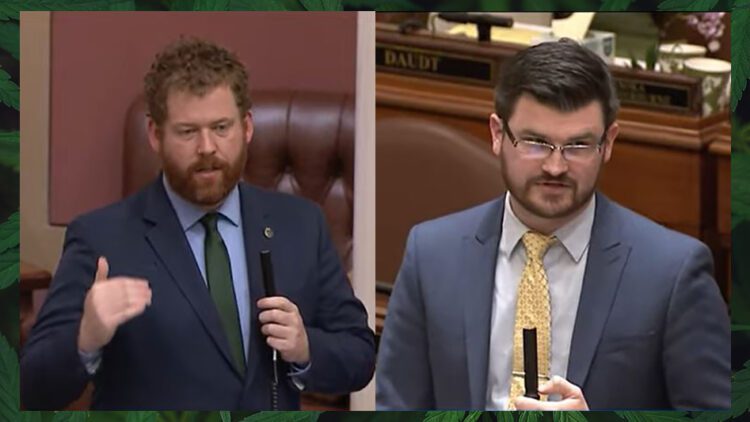Minnesota stands poised to legalize cannabis for adult use, following a decisive vote on May 18 by the House. This decision occurred just prior to the end of the legislative term. The proposed law now needs approval from the Senate before reaching the governor’s desk.
Although the House vote, 73-57, comfortably passed the measure, the Senate vote could be a contentious issue, likely falling strictly on party lines. The Democrats hold a slim majority in the Senate. If approved, Governor Tim Walz has pledged to sign it into law.
This significant move took place after Senate and House representatives harmonized their stances on the legislation during a three-day conference committee, which wrapped up on May 16.
The final wording of the 320-page legislation proposes to permit adults aged 21 or over to purchase up to 2 ounces of cannabis from licensed vendors, possess up to 2 pounds at home, and cultivate up to eight plants (four of which can be mature). These changes would be enacted from August 1, 2023.
The legislation also plans to form a regulatory body to govern the budding cannabis market, and establish regulations, licensing, and taxation for Minnesota’s existing hemp industry.
Democratic-Farmer-Labor Party’s Rep. Zack Stephenson and Sen. Lindsey Port championed parallel bills before unifying their versions.
Stephenson made an emotional final address regarding the bill, expressing that the day marked a momentous occasion for Minnesotans who have long sought this change. He commended the cooperative efforts of the conference committee.
Notable agreements included purchase and possession limits, a 10% excise tax rate, economic growth, employment rules, licensing, criminal penalties, expungement, and tax revenue allocations.
In spite of the collaboration, the House Republicans expressed their dissatisfaction, while Democrats expressed their support. This debate lasted for nearly five hours prior to the final vote on May 18. Despite this, Rep. Nolan West persuaded his Republican peers to vote yes.
West had earlier criticized the Democrats for including what he termed “far-left” ideas, particularly regarding preferential license scoring for social equity applicants. However, he acknowledged the Democrats’ openness to include minority party input on various facets of the bill, which incorporated over a dozen Republican amendments.
One significant alteration from the conference committee negotiations was the adjustment of local control, a major contention point in earlier debates.
The bill includes various provisions. Notably, a Cannabis Management Office is slated for establishment by July 1, 2023. Under this proposed law, a 10% cannabis excise tax would be applicable at retail, in addition to the Minnesota 6.875% sales tax. Also, the bill proposes 16 licensing categories to ensure a competitive, stable, and sufficient cannabis market. As part of the effort to rectify harms caused by prohibition, the bill provides for automatic expungement of certain cannabis offenses, beginning from August 1, 2023.
Further, Rep. West emphasized the importance of eradicating the illicit market to enhance public safety, and argued for the legalization of cannabis as an issue of individual liberty.
A prominent feature of the legislation is the planned creation of an Office of Cannabis Management (OCM). The office’s mandate would be to ensure the smooth functioning of the forthcoming adult-use program, as well as the existing medical cannabis and hemp initiatives. Though, the development of consumer protections and a licensed framework could take anywhere from a year to a year and a half before adult-use dispensaries can open, according to Stephenson.
Moreover, the law would form a cannabis advisory council, mandate specific studies on legalization’s impacts, and establish a statewide tracking system. Currently, the state’s medical program utilizes the Metrc tracking platform.
The bill proposes a two-tiered taxation system. On one hand, a 10% cannabis excise tax would be imposed at the point of sale, in addition to Minnesota’s standard 6.875% sales tax. On the other, 20% of the revenue generated from this excise tax would go to local authorities to facilitate the governance of a legalized market. The remaining 80% would fund state initiatives, such as the OCM, youth education, an expungement board, and employment and economic development programs, among others.
Another significant provision aims at redressing the damage caused by prohibition. It calls for the automatic expungement of certain cannabis-related offenses. The Bureau of Criminal Apprehension would identify individuals eligible for expungement. This process would commence from August 1, 2023.
The proposed legislation features 16 distinct licensing categories for adult-use, medical, and hemp operations. It also introduces provisions for a social equity program designed to ensure that individuals and communities most adversely affected by prohibition have an opportunity to participate in the industry.
An important task of the OCM would be to license a number of cannabis businesses necessary to ensure adequate supply, market stability, competitive market, and to limit the sale of unregulated cannabis products.
In terms of revenue generation, apart from taxes, the state would collect application and licensing fees. For cannabis growers, these fees would include $10,000 for applications, $20,000 for an initial license, and $30,000 for license renewal. There would be similar fees for retailers, manufacturers, wholesalers, and microbusinesses. Another licensing type, the “cannabis mezzobusiness,” would allow medium-sized businesses to enter the market with fees of $5,000 for application, initial license, and renewal each.
The proposal also seeks to establish plant propagation standards, including certification, testing, and labeling requirements for new cannabis plants. It outlines requirements for best agricultural practices and environmental standards.
Rep. West argued that the primary public policy objective of legalization is to eliminate the illicit market. He stated, “It’s not inherently dangerous, but if there’s fentanyl in it, well now it’s going to get you in trouble. But opening up to a legal market will allow these things to be tested and approved…And that’s very important.” West also underscored the importance of ending cannabis prohibition as an issue of individual liberty and freedom.









